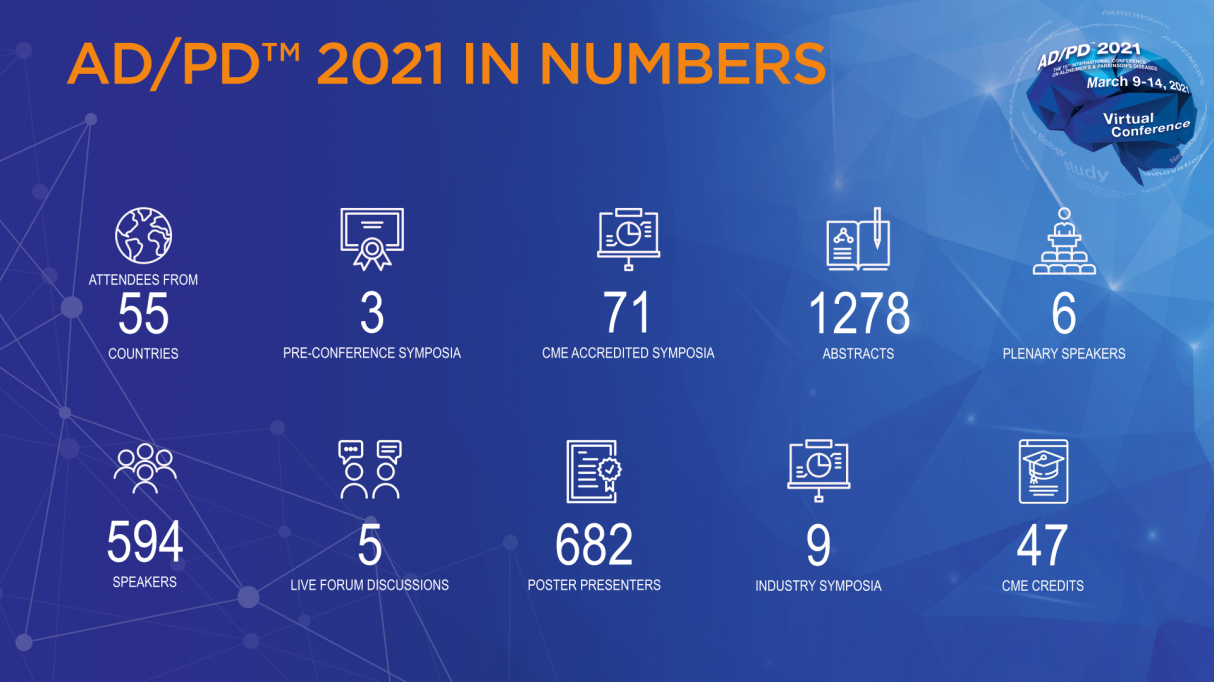AD/PD™ 2021
March 9-14, 2021 | Virtual Conference
The 15th International Conference on Alzheimer’s and Parkinson’s Diseases and related neurological disorders, AD/PD™ 2021, built on the well-earned reputation of the groundbreaking series of Alzheimer’s and Parkinson’s Diseases Conferences, attracting international medical and scientific professionals.
The AD/PD™ 2021 conference was held as a fully online, virtual experience. This allowed us to unlock new avenues and opportunities for all stakeholders and made it accessible to a wider audience worldwide. The AD/PD™ 2021 virtual platform is available for all registered attendees until 14 June, 2021.
For AD/PD™, the science of finding solutions for patients with Alzheimer’s and Parkinson’s diseases has always been in our DNA. Even in difficult times, the science remains our first priority. Exchanging scientific data and sharing novel insights must not wait.
Organizing Committee
Abraham Fisher, Ph.D.
President
Roger M. Nitsch, M.D.
Executive Organizer
Manfred Windisch, Ph.D.
Executive Organizer
Conference Website: https://adpd2021.kenes.com/
Donanemab Confirms: Clearing Plaques Slows Decline—By a Bit
“The Phase 2 trial provides the strongest evidence yet that removing most amyloid from the brain bolsters cognition, although the benefit is small.”
Astroglial Markers Poised for Stardom?
“A new PET tracer. Plasma glial fibrillary acidic protein. Two new, promising surrogates for astrogliosis are filling in the Alzheimer’s biomarker toolbox. Both reflect Aβ amyloid better than they do tau tangles.”
Shuttle Unloads More Gantenerumab Into the Brain
“New data presented at the AD/PD conference offer the first evidence that a brain-shuttle strategy can work in people; the lecanemab and aducanumab antibody programs offer small updates.”
N-Terminal Tau Antibodies Fade, Mid-Domain Ones Push to the Fore
“The field is shifting from targeting tau’s tips to its mid-region, especially where tau binds microtubules. Several new candidates are in the clinic; whether the strategy will work remains to be seen.”
Where to Now, Phospho-Tau?
“Researchers envision p-tau-based blood tests for Alzheimer’s disease within a few years, but maybe not a stand-alone test.”
Clinicians from Developing Nations Discuss Dementia in Their Populations
“As life expectancy increases in countries such as Nigeria, Brazil, China, and others, so does the number of people with dementia. How to provide modern care for them?”
New Mouse Models Better Mimic Tauopathy, Alzheimer’s
“Two mouse models presented at AD/PD may hand scientists more translationally relevant tools to explore LOAD pathophysiology and treatment. The tricks: targeted replacement and knocking in multiple GWAS variants.”
For α-Synuclein Immunotherapy, Is Going Later the Key?
“In the negative Phase 2 trial of prasinezumab, populations with more rapid decline benefited; this informed the design of a new Phase 2b study.”
COVID-19 Worsens Neurological Problems, Delirium
“At AD/PD 2021, clinicians discussed neurological symptoms and brain tissue damage in older people who died from COVID-19.”
Clinical Trials in COVID Era: How To Keep Moving Forward
“By shifting to home nursing and telemedicine, clinical researchers kept inching ahead during lockdowns.”
Drop of Hope? No Cognitive Worsening on BACE Inhibitor
“Data from Phase 3 trials of elenbecestat show no harm to cognition, leaving open a chance that the drugs could be used safely in the future.”
“New research implicates IL-6 signaling and even Aβ42 itself as BACE targets, complicating efforts to resurrect BACE inhibitors at a low dose.”
Does Synchronizing Brain Waves Bring Harmony?
“Based on early stage trials, scientists at AD/PD said that light and sound can promote neuronal communication, calm immune cells, and slow brain atrophy. On cognitive outcomes, the jury is still out.”
At AD/PD: More Evidence on Herpes and Alzheimer’s Disease
“Data from France and Germany bolster the proposed link between herpes virus and Alzheimer’s. Infection upped risk in ApoE4 carriers, damaged brain tissue, and correlated with neurodegeneration markers in the CSF.”
In Pilot Study, Electric Therapy Improves Memory
“At AD/PD, researchers reported that low-intensity electric current sent through the brain at gamma frequency restored cholinergic transmission and boosted short-term memory.”


